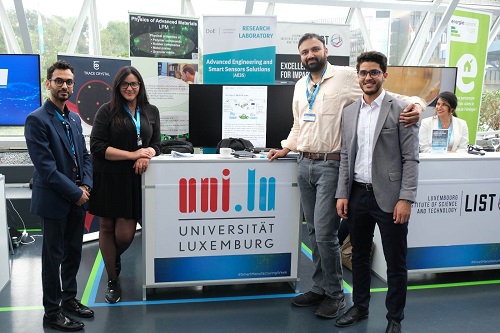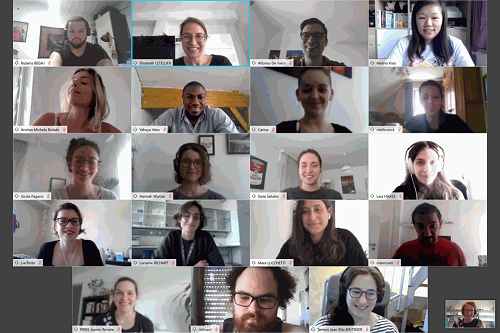In the frame of the Cancer Biology “CANBIO” doctoral training unit launched in 2016 by the University of Luxembourg, the Luxembourg Institute of Health (LIH) and the Laboratoire National de Santé (LNS), the first virtual PhD defence and online training module took place at the time of COVID-19.
Despite recent progress in drug development, cancer is incurable in many instances and remains one of the main challenges of modern-day medicine. One of the factors that contribute to its insidiousness is the ability to circumvent surveillance by the body’s immune system and to develop drug resistance mechanisms. The understanding of these “escape” strategies is therefore crucial in the fight against cancer. In this context, the University of Luxembourg, the Luxembourg Institute of Health (LIH) and the Laboratoire National de Santé (LNS) launched the Cancer Biology “CANBIO” PhD training programme in 2016, with the aim of providing state-of-the-art training in cancer biology to young scientists, thereby leading to the development of more effective therapies and fostering translational research.
First PhD defence under CANBIO
On 27 April 2020, doctoral candidate Ines Kozar defended her thesis “From drug resistance mechanisms to miRNA function in melanoma”. Supervised by Prof. Stephanie Kreis from the Department of Life Sciences and Medicine (DLSM) at the University of Luxembourg, her work focuses on novel approaches to tackle drug resistance in melanoma, an aggressive skin cancer originating from the uncontrolled proliferation of pigment-producing melanocytes. Dr. Kozar identified a new set of inhibitors that showed promising results for the treatment of late-stage melanoma patients. In addition, she detected a series of genes and microRNAs that were expressed in different patterns in drug-resistant compared to drug-sensitive cells, thus suggesting a role for miRNAs in the transition from sensitivity to tolerance.

“We are very proud of Ines’ work and achievements. She has been the first CANBIO student to graduate, having already contributed to 6 peer-reviewed publications plus an additional one currently under review. On top of this, she has also been the first candidate to have defended her thesis completely remotely via Webex! Indeed, high-quality cancer research “made in Luxembourg” carries on despite the current COVID-19 situation, since cancer does not stop and millions of patients are still in urgent need of new therapies”, states Prof. Stéphanie Kreis.
First online training module
In addition to the project-based training, the CANBIO programme has implemented a specific training curriculum which consisted of three main modules, running between October 2019 and May 2020. After the two modules “Computational approaches to disease monitoring and network analysis” in October 2019 and “Induced Escape Mechanisms” in February 2020, the third module “Intrinsic escape mechanisms” was delivered entirely remotely in April-May 2020. It covered the basic principles of tumorigenesis and therapy, preclinical models, tumour heterogeneity in relation to therapeutic principles, as well as invasion and metastasis.

“CANBIO concentrates on the mechanisms enabling cancer cells to constantly adapt to their environments and survive therapeutic treatments. Unfortunately, these molecular changes do not stop with the COVID-19 pandemic, and so we too decided to adapt to the current situation in order to keep delivering quality cancer training to our students, providing them with the knowledge and skills they need to eventually develop novel solutions to the pressing issue of tumour escape”, says Prof. Simone Niclou, Director of the Department of Oncology (DONC) at LIH and CANBIO coordinator. “Our PhD candidates have once again proved their commitment to their scientific training and their flexibility, which was key in ensuring the successful outcome of the virtual course”, she concludes.
About CANBIO
The CANBIO programme, which has a duration of 6.5 years, is a joint initiative of the Luxembourg Institute of Health, the University of Luxembourg and the Laboratoire National de Santé, in collaboration with national and international partners, including the Centre Hospitalier de Luxembourg (CHL), the University of Bergen (Norway) and the University of Paris-Saclay (France). The programme is funded by the Luxembourg National Research Fund (FNR) through the competitive PRIDE programme and by intramural funds from the Luxembourg Ministry of Higher Education and Research (MESR).
